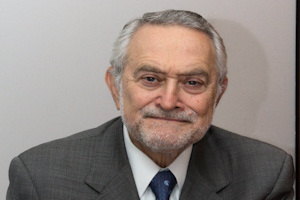New Director for Institute of Cancer Sciences
15 Apr 2014
One of the world's most cited scientists - knighted by the Queen for services to the subject - has taken the helm as Director at the University's Institute of Cancer Sciences.

Professor Sir Salvador Moncada has been responsible for discoveries which have aroused huge excitement in the scientific world and founded, and until recently directed, the Wolfson Institute for Biomedical Research at University College London (UCL).
Cancer research at Manchester has been officially ranked as world-leading and the best in the UK in the most recent prestigious government-led Research Assessment Exercise. The University has since teamed up with The Christie NHS Foundation Trust to recruit a further 20 top-flight cancer experts to work on improving treatments.
Professor Moncada moved to Manchester from UCL last year and has been working as Professor of Translational Medicine and Strategy in the new Centre for Cellular Metabolism based in the University’s Institute of Cancer Sciences. He takes up his new post during an exciting phase for the University, which is due to open a new £28.5 million Manchester Cancer Research Centre building in Withington in partnership with The Christie and Cancer Research UK later this year. The MCRC building will house staff from the Institute of Cancer Sciences as well as those from CRUK Manchester Institute, which is also part of the University, and The Christie.
Professor Moncada said: "The University of Manchester has an outstanding history of research and innovation and there are currently many exciting things happening within the field of cancer. It’s a fantastic time to work in this area of research and I am delighted to be leading a team of scientists and clinicians which has already made a big contribution to the understanding and management of this very important disease.”
Professor Moncada's scientific career began at the Royal College of Surgeons where he collaborated in the discovery that aspirin-like drugs inhibit the metabolism of arachidonic acid. This finding clarified the mechanism by which these drugs act as pain relievers, control fever and reduce inflammation, and also explained the mechanism by which they cause gastric damage.
While working at the Wellcome Research Laboratories, Professor Moncada led the team whose work contributed to the understanding of how low doses of aspirin prevent cardiovascular episodes such as stroke. As Director of Research there he presided over the work that resulted in the development of several new medicines, including lapatinib for the treatment of breast cancer. The identification of nitric oxide as a biological mediator and its importance in the cardiovascular system was another career highlight. His work in this subject area also provided much information about the roles of nitric oxide in the peripheral and central nervous system and in cancer.
Professor Moncada's recent work has focused on the areas of mitochondrial biology and how cells utilise their metabolism to support proliferation.
Professor Ian Jacobs, Dean of the Faculty of Medical and Human Sciences and Vice-President at The University of Manchester, said: “Salvador is a great scientist who has already made a major contribution to science and health and is one of the world’s most highly-cited researchers. His research and leadership have led to many new treatments for conditions ranging from heart disease and cancer to malaria, epilepsy and migraine. I am delighted that following his recruitment to Manchester, Salvador has agreed to take on the role of Director of the Faculty Institute of Cancer sciences. He will work closely with the leadership of The Christie hospital, the Cancer Research UK Manchester Institute and many others across the University and Manchester Academic Health Science Centre in driving forward our ambitious plans for cancer research. He is a truly outstanding addition to our Faculty team.”
